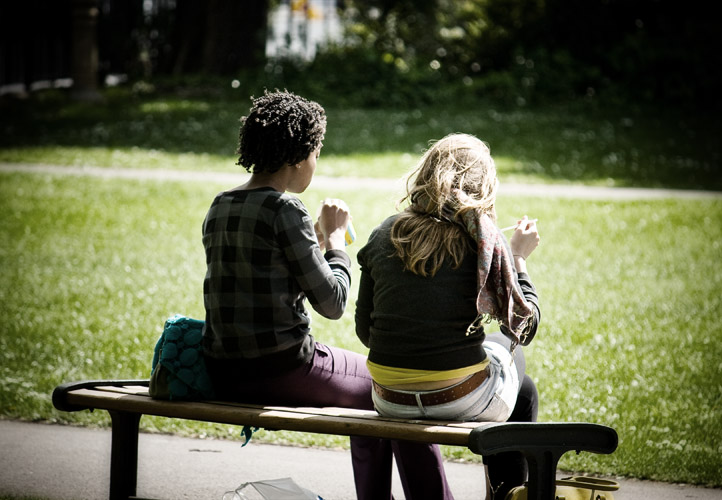
Let’s have lunch together – or a drink?
One day last month, while eating lunch at my computer at work, I browsed to my Facebook page and clicked on a link to the website of the Association for Psychological Science (APS). The picture caption piqued my interest: it suggested I should have been having my sandwich away from my desk.
The piece on the APS website cited a recent study by Kniffin, Wansink, Devine, and Sobal (2015) who found that sharing meals may have a positive effect on collaborative work tasks. It also cited an earlier study showing that alcohol may increase social bonding among people who are getting to know each other (Sayette et al., 2012). So should I have invited a colleague to have lunch together? Or should I have gone out for a glass of wine? It appeared that both might have had a positive impact on my day…
“sharing meals may have a positive effect on collaborative work tasks”
In the study by Kniffin et al. (2015), 244 mostly male officers working in 13 firehouses located in a large American city completed questions on how often they cooked group meals during work shifts and ate them together. They also rated the performance of their current work group, as well as the group’s level of overall cooperation. Sharing meals was positively associated with group performance, and this association was not mediated by overall levels of cooperation. In other words, meal sharing may have improved performance independently of how well the groups cooperated on activities in general.
While you might think that these findings could be specific to the group under study (firefighters), they reminded me of one of my previous studies, which was concerned with how people behave with others when eating (aan het Rot, Moskowitz, Hsu, & Young, 2015). We employed a method known as ecological momentary assessment to examine how people interact socially in their everyday lives. Study participants were asked to record for about 3 weeks how they felt, behaved, and perceived others during naturally occurring interpersonal encounters, which usually took place multiple times each day. While interacting with others during a meal, participants reported more pleasant feelings and more friendly behaviour than at other times. They also found their interaction partners friendlier. This suggests that meals are events during which social bonds are strengthened. Moreover, displays of hierarchy may be reduced during meals, as indicated by lower reported levels of dominant and submissive behaviours.
“meals are events during which social bonds are strengthened”
Our results were largely unrelated to the context in which the meals took place, for example the behavioural changes were seen at home and at work. Moreover, as participants were working men and women with various jobs and interacting with various others, they represented the general population better than the firefighters studied by Kniffin et al. (2015). Nonetheless, both studies’ findings were very similar. Thus, meal sharing may usually have positive effects on behaviour and behavioural outcomes.
What excited me most about the study by Kniffin et al. (2015) was that it highlighted the potential benefits of sharing meals at work. It got me thinking about the fact that while some research groups in the Heymans Institute frequently organize common meal times, other groups do not. Also, committee meetings usually do not involve eating together. Yet perhaps all of us might benefit from regularly having lunch with colleagues.
“all of us might benefit from regularly having lunch with colleagues”
And what about sharing meals with students? Kniffin et al. (2015) studied groups of firefighters working together, people who probably knew each other well. Similarly, in our study (aan het Rot et al., 2015) meal times usually involved known others, such as co-workers, friends, and romantic partners. As I do not personally know most students in the department, the results of both studies may not readily apply. However, this is where the study by Sayette et al. (2012) might be relevant.
Sayette et al. (2012) randomized 720 unacquainted young adults to groups of 3. All individuals in each group received alcohol, a placebo (which led them to believe that alcohol was given), or a control drink (which clearly involved no alcohol), and interacted while drinking. They were videotaped so their facial expressions and speech could be assessed. Individuals who drank alcohol talked more, smiled longer, and expressed fewer negative feelings. Moreover, their ratings on a group reinforcement scale were higher, suggesting that alcohol increased social bonding, at least subjectively.
“getting to know people is easier with a glass of wine”
If getting to know people is easier with a glass of wine, then maybe this is why café De Minnaar is frequented by Heymans staff as well as by students. The Clinical Psychology group meets there once a month. Come say hello next time! Sayette et al. (2012) would probably be pleased to know that you are taking their message seriously. And if you have other ideas on how to better organize events involving both students and staff, let’s talk about it over lunch!
References
aan het Rot, M., Moskowitz, D. S., Hsu, Z. Y., & Young, S. N. (2015). Eating a meal is associated with elevations in agreeableness and reductions in dominance and submissiveness. Physiology and Behavior, 144, 103-109.
Kniffin, K. M., Wansink, B., Devine, C. M., & Sobal, J. (2015). Eating together at the firehouse: How workplace commensality relates to the performance of firefighters. Human Performance, 28(4), 281-306.
Sayette, M. A., Creswell, K. G., Dimoff, J. D., Fairbairn, C. E., Cohn, J. F., Heckman, B. W., . . . Moreland, R. L. (2012). Alcohol and group formation: A multimodal investigation of the effects of alcohol on emotion and social bonding. Psychological Science, 23(8), 869-878.
Note
Image by Angie Muldowney licenced under CC BY 2.0.



